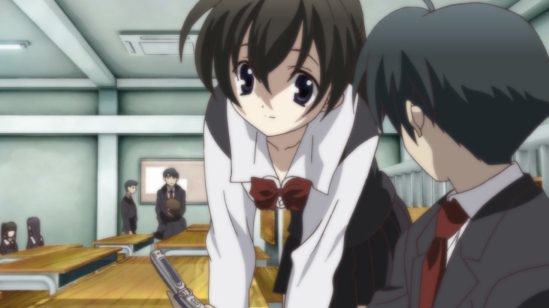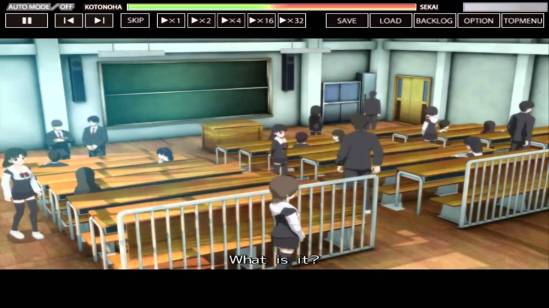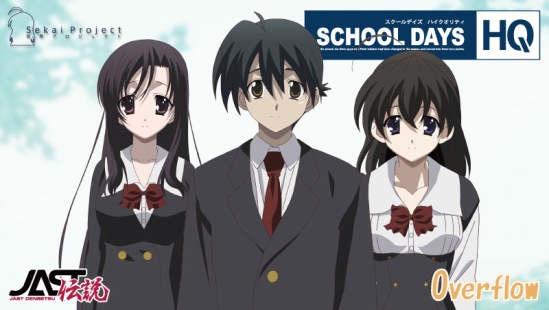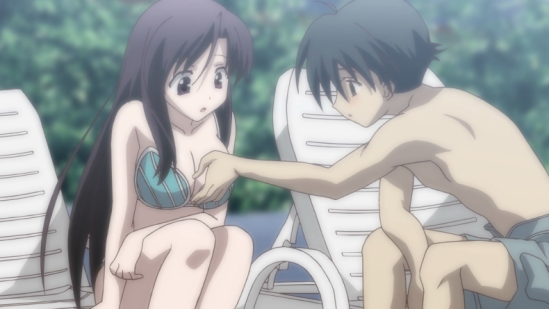THE PINNACLE OF HIGHSCHOOL FLAVORED ROMANTIC STORY TELLING
DEVELOPER: Overflow
PUBLISHER: Jast USA
PLATFORM: PC
DATE: 12/03/2013
School days is not a computer or video game in the typical sense that most would associate with. There is no game over screen, you can’t die then respawn, health gauges are replaced with a constantly changing relationship strengh metric and the only battles you will fight are against morality and your libido. Do you try to initiate more physical contact with your quiet, reserved girlfriend and risk her pulling away because she’s mentally unprepared for an intimacy or do you go with your over-ambitious friend thats been discreetly seeking your attention since the start of the school year? These are the choices you must continually asses as School Days short, but nonetheless gripping, revolving love-triangle goes forward.
For the uninformed, and there are thousands of you to be sure, School Days HQ is high-definition retelling of Japanese developer Overflow’s anime-inspired original “Visual Novel” (or VN for short), aptly titled School Days, released in 2005 becoming an instant hit in the east. VN’s are immensely popular in Japan, using beautifully drawn static or animated images to convey a non-linear story. School Days resonated soundly with Japanese audiences because unlike most VN’s, it contained fully animated sequences for the entirety of the game whereas most visual novels had very little actual animation, with still pictures followed by Japanese voice acting over scrolling text.
While you don’t have much interaction initially, eventually you will be lead to make choices via the in-game menu which in effect, can send you spiraling off on a completely different story arc. More choices will follow, until the path you choose becomes your own. A “choose-your-own-adventure” book for the digital era, only with more adult themes and for many VN’s, graphic violence and strong sexual imagery. School Days HQ is no exception to these scenarios, depicting several instances of sexual acts between the main and supporting cast, amongst other things better left unspoiled.
The core of the game revolves around highschool student Makoto Ito, a first-year classmen who lusts for Kotonoha Katsura, a demure yet physically beautiful and matured girl for her age. She is bullied by the other girls at their school, mainly jealous of her voluptous attributes believing her to steal away the most desired male classmates from them and she remains lonely and unpopular with many of the female students. Makoto develops a crush on Kotonoha while observing her on the train rides to school, but lacks the nerve to approach her. Makoto continues to admire her from afar, even snapping a photograph of her riding the train one day and plastering it as his cellphone wallpaper. According to a superstition, or “charm” (good luck), as Japanese culture defines it, if Makoto can leave the wallpaper of Kotonoha discreet and unseen for a specific duration their love will be realized. While Makoto looks at her picture one day in class, his classmate whos sits next to him, Sekai Saionji, nosily interrupts him as he pines over it.
She questions Makoto and his pursuit of the wallpaper charm, asking if he is a participant. He becomes curious when she asks about the charm, noting that she likes to snoop around other peoples affairs and asks what interest she has in his private life. She denies knowing anything about his unrequited love at first but when pressed by Makoto, she admits to accidentally viewing the picture of Kotonoha, thus angering Makoto for breaking the good luck charm. Sekai insists that he will need to be more willful and not rely on charms if he wishes to date Kotonoha and offers to play matchmaker. Sekai befriends Kotonoha during school and exchanges phone numbers with her. She informs Makoto during lunch atop the school roof that she has already made quick progress making Kotonoha her friend, and to Makoto’s delight he thanks her for her assistance. Once Sekai and Makoto leave school and wait for the train together, he questions as her motives behind her help. She deceptively explains that there is nothing more exciting then watching a romance blossom and having a hand in it’s creation, although Sekai in truth is only playing matchmaker to become closer to Makoto. He asks her what he can do to return the favor to her, and as she contemplates, she quickly turns to Makoto then gives him a deep kiss on the lips before running off to board her own train home. As the train departs, Sekai is seen breathless, distraught and tearful while Makoto is awestruck, left to ponder Sekai’s true intentions. And here, we have the catalyst for how School Days will play out.

Sekai has her seat deliberately changed by best friend Setsuna so she can be seated next to Makoto. She can be a sweetheart, but also very nosy and manipulative.
Depending on the route you choose throughout the game, your feelings will vary by the choices you make, represented by a gauge for one girl or the other. Whatever color the gauge turns will tell you whether Makoto is reciprocating Kotonoha’s or Sekai’s feelings, if the romance is becoming more or less passionate or his feelings have turned completely indifferent towards one of the girls (or both). Kotonoha progress metric is represented in green, while Sekai’s is represented in red which helps differentiate the two. As each chapter closes you are shown a meter for both girls and how far your romance has increased or decreased with each. With over 20-something endings, School Days HQ final chapters can vary wildly from good to notoriously bad to downright bizarre. One path will close with your main character conflicted over his current monogamous relationship contemplating “Is this love?”, while a completely polar opposite ending has you bearing witness to the demise of one of the main female heroines in a truly gratitous fashion that only anime could stylize as beautifully savage. School Days is particularly known for it’s brutal finales, as they require you to skillfully navigate between certain bad decisions to obtain. You wouldn’t think fucking up a relationship with your partner would be that difficult, but in School Days you can choose who to love, who to deny and how bad you want to lie just to get what you want, with Makoto showing little to no empathy in some cases. To see how atrocious things can play out for protagonist Makoto Ito you will most likely have to be the best douchebag you can be by making the situations between whichever partner Makoto is with an absolute mess. I admit, at some points I felt the need to emotionally disconnect with the game to treat these women so badly because they really do their best to stay with Makoto regardless of how irredeemable his character becomes. Playing to view the 4 or 5 bad endings can be a chore, but if you can manage to forget the maidens feelings and play asshole style (which can also be fun, as some of the “happy endings” are dull anyways), it can be a good time just for the sake of watching how awful things can really unfold for all three main characters.
But that’s the name of the game. YOU dictate the story by selecting a choice towards how you feel towards your love interest, or plural; interests. When the time comes to make a decision during one
of the games many branching sequences, School Days gives you a small window of time to make up your mind, or do nothing at all and let the decision process effectively “time out”. Time out’s are an alternative to “choice A” and “choice B”, and depending on how you play the game they could be between making a terrible choice or an even worse one. Letting the game time out during a choice selection seems almost inherent to Makoto Ito’s nature, since he appears to be an indecisive, ambivalent man-child that has to be guided about which relationship he is the least decisive about. Everytime I came to the choice menu, I felt as if the Jeopardy theme was playing, and I was awaiting the buzzer because I didn’t decide in time.
I love and hate this system. It forces you to react on natural instinct, but because the window of opportunity for decision making is literally like 7-8 seconds it’s hard to remember sometimes the choices you’ve made via a previous playthru, meaning you may come to the same conclusion more than once after the 3-6 hour campaign is finished. There is a Rewind/Skip ahead feature in-game that allows you to skip various scenes that you’ve already played through or rewind to a previous decision you felt was errant. Thankfully if you feel the need to go back in time and make a different choice, School Days affords you the freedom to do so. Achieving all the various endings, bad and good, neutral and odd, will warrant multiple playthru’s and since there is a ton of cinematics and sequences that will be unlocked contigent upon which choice you push Makoto into, there is a ton of interesting scenarious that can play out for your viewing pleasure. Some of these scenes involve Makoto having sex with the various heroines while others are more tender in nature, with Makoto recieving a passionate kiss, hug or even a confession of love. With the plethora of endings available, you are almost guaranteed to see 5-10 endings and maybe even an epilogue or two just playing out the game naturally, but if you want to see them all I suggest writing down your choices for each successive playthru. You can also save the game in between chapters or during play, although I typically only used the save feature once a chapter was complete and I knew the story was branching to a different path.

The game screen at full resolution. Simple and easy to navigate, it works perfectly for what the game requires of the player
On my second playthru I encountered one of the more difficult to achieve endings that involved a supporting female character, Setsuna Kiyoura, who is Sekai’s best friend since childhood. It was a pleasantly surprising finale to a long playthru and I relished every minute of it. As you come to play the game several times you will start to see the characters for who they really are, and while Makoto can certainly be a bastard perhaps the worst offender is Sekai herself. While at first she seems helpful to Makoto’s needs for helping him catch his dream girl Kotonoha (who starts off as an innocent, lovely girl but eventually as you playthru multiple times she even becomes corrupted by Makotos lust for sex), Sekai’s duplicitous nature of deceiving both Makoto and Kotonoha for her own benefit reveals her to be manipulative, brash and an extremely jealous person. She also exhibits behavior of extreme insecurity, with Setsuna coming to her aide when she is depressed and even encouraging her bad behavior, all of course depending on the decisions made.

Setsuna is a supporting cast member and best friend of Sekai. Although the two female leads have lovely attributes and personality traits, Setsuna was by far my favorite. Her icy demeanor and quiet resolve gives her personality strength despite her small stature, though she has a hidden sweet and generous side.
Conclusion:
School Days HQ is a excellent introduction to the market of Visual Novels for any gamer looking for something different. Even more so VN’s can be accessible to the lucrative casual gamer market who are turned away by the constant assault of twitch-shooters, the difficulty and violence of adventure games and the lengthy progression systems and steep-learning curve of RPGS. The casual gamer market has a lot of untapped potential for growth, and while the heavy adult content of School Days may push some away, other casual gamers who won’t bother with traditional console/PC games because of constant player deaths due to escalating difficulties and constantly facing frustrating “Game Over” screens may find relief and satisfaction with a title like School Days HQ.
FINAL SCORE: 4/5




Pingback: Atlus announces new Persona titles incl. Persona 5, New Tales of Xillia 2 NA trailer, Shiny Days Visual Novel coming to the West and School Days HQ review posted | hiddendefinition